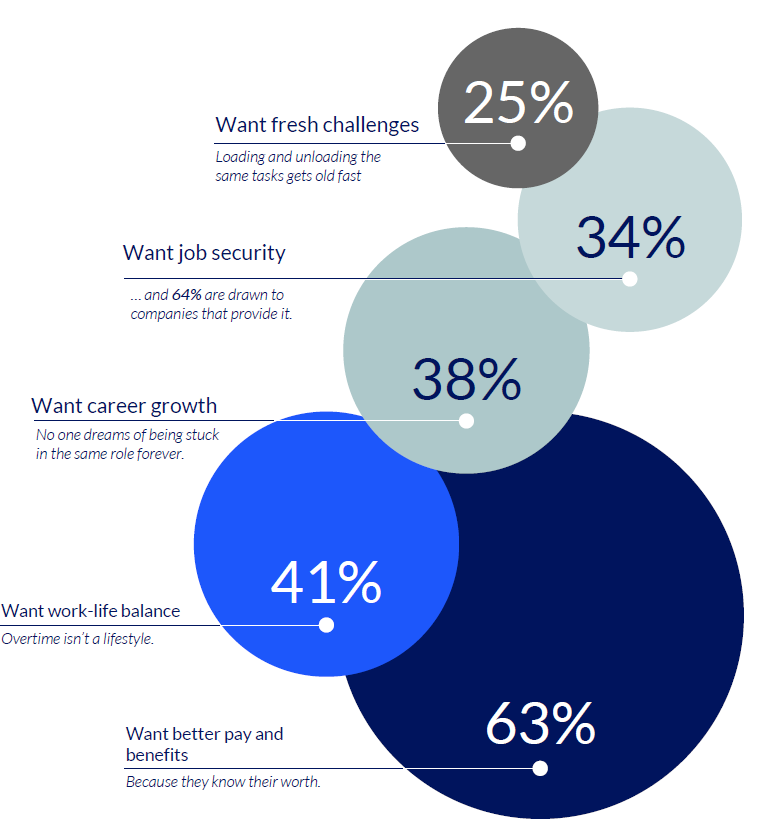As global supply chains grow more complex and seasonal demand becomes less predictable, logistics has become one of the most critical and talent-sensitive sectors in Switzerland. With workforce shortages intensifying and digital transformation reshaping job profiles, companies in this field need new strategies to stay competitive.
In this article, we explore the key trends shaping the logistics labor market in Europe and Switzerland in 2025. Drawing from new insights published in the “2025 Europe Logistics Workforce Trends” and “The Logistics Talent Landscape” reports of Gi Group Holding, we highlight how employers can address demographic challenges, shifting skill demands, and operational volatility. We also share how Gi Group Switzerland supports companies across the logistics value chain with tailored staffing and workforce solutions.
Key European findings: from automation to aging – a sector in transition
Across Europe, logistics remains a major employment engine, especially in warehousing, transport, and distribution. However, talent supply is tightening as populations age, younger workers shift to other industries, and job requirements become more complex.
According to the “2025 Europe Logistics Workforce Trends” report, logistics job growth in Europe is slowing. Between 2018 and 2023, employment growth in the sector dropped to 0.6% per year. This growth rate is expected to decline further to just 0.4% through 2027.
This slowdown occurs despite rising demand in specific areas:
+405,000 job postings required communication skills
+196,000 postings mentioned SAP expertise
+196,000 postings required supply chain management skills
The fastest-growing logistics roles include warehouse team leaders, supply chain planners, and transportation coordinators. Many of these positions blend technical proficiency with soft skills such as leadership, adaptability, and communication.
Soft skills are increasingly valued: postings citing management capabilities have surged by 253% and safety training by 213%. In parallel, digital transformation continues to reshape expectations, especially in planning, routing, and real-time monitoring roles.
Digital skills meet human resilience
As logistics companies integrate automation, robotics, and real-time analytics, the workforce needs to evolve. But automation doesn’t mean fewer people—it means different people, with hybrid skill sets.
“The Logistics Talent Landscape” report highlights a growing need for skills in:
- Data analysis & forecasting
- Cybersecurity for supply chain systems
- Last-mile delivery optimisation
- Safety & compliance amid changing regulations
However, identifying talent who combine digital fluency with hands-on logistics experience is only part of the challenge. Retaining them in a sector often marked by high turnover, time pressure, and limited progression pathways requires listening to what workers actually want.
The same report reveals a clear picture: today’s logistics candidates aren’t only looking for better pay. According to survey results, what they value most includes
This signals a crucial alignment gap: while employers focus on building digital capabilities and operational efficiency, talent increasingly prioritises sustainable work models, safety, and career development. Successful logistics companies will be those that bridge this gap—by investing not just in tech, but in people.
“Digital transformation will only succeed if it’s paired with human engagement. Our clients are starting to recognise that flexible shifts, training programs, and career pathways are as important as automation when it comes to talent retention,” says Silvano Castellani, Operations Manager Temp & Perm at Gi Group Switzerland.
Switzerland: precision logistics meets workforce pressure
Switzerland is known for precision, reliability, and high-performance logistics. The country plays a vital role in European supply chains, especially in pharmaceutical, luxury, and precision manufacturing sectors. Yet its logistics workforce is under pressure.
Key dynamics in the Swiss market include:
- A sharp increase in seasonal and project-based demand
- A decline in logistics job growth: -3.4% from 2018–2023, with a further -1.5% projected through 2027
- High dependence on foreign workers (36% of the logistics workforce)
- Rising recruitment difficulties, especially for warehouse, driver, and dispatch roles
As Silvano Castellani explains: “Swiss logistics is highly specialised and increasingly seasonal. Our clients face demand peaks they can’t manage alone. The ‘hire-in-hire’ model is proving essential—flexible enough to scale with market needs, but structured to retain critical know-how.”
Three priorities for Swiss logistics employers
- Build a flexible seasonal workforce strategy
Logistics demand fluctuates rapidly, especially during holiday seasons, promotions, or weather-related shifts. Temporary staffing is essential, but needs to be strategic.
Leading employers are:
- Creating seasonal talent pools in advance
- Implementing just-in-time workforce planning
- Working with external partners for fast response
Gi Group supports logistics clients with predictive talent deployment, enabling fast adaptation to peak periods.
- Combine digital skills with operational expertise
Even in roles like forklift operator or order picker, digital literacy is becoming critical. Employers must invest in continuous upskilling to align with the growing use of warehouse management systems (WMS), inventory tech, and real-time tracking.
Gi Group provides tailored training support and access to talent with both traditional and emerging skills.
- Stabilise with hire-in-hire and retention models
While temporary work supports short-term needs, Swiss companies are increasingly blending temp and perm strategies. Hire-in-hire models allow companies to:
- Onboard talent quickly
- Extend contracts based on performance
- Retain valuable workers without upfront risk
Silvano Castellani stresses: “The hire-in-hire model gives our logistics clients the flexibility they need without sacrificing quality. It allows them to recruit temporarily without committing to long-term contracts right away—while progressively integrating the right talent into their operations. For many, it’s the most secure way to balance workforce stability with operational agility.”
Added value from Gi Group Switzerland
Gi Group Switzerland is one of the few HR partners in Switzerland with deep logistics expertise across warehousing, distribution, and transportation. The added value includes:
- Nationwide talent pools ready for seasonal deployment
- Hire-in-hire and Try & Hire solutions with clear conversion paths
- Full compliance with sector-specific regulations and safety protocols
- Workforce planning support for volume projects, site launches, and restructurings
As Castellani notes: “In logistics, your people are your performance. At Gi Group Switzerland, we help clients build workforces that are resilient, scalable, and fit for transformation. We support companies in the logistics and transportation sectors with specialized workforce solutions across the entire value chain. Leveraging our expertise in recruiting, onboarding, and workforce management, we deliver tailored staffing concepts that enable both temporary assignments and long-term placements. Our extensive talent pool and proven skill-matching capabilities allow us to respond quickly and flexibly to seasonal peaks.”
Plan today for peak performance tomorrow
Switzerland’s logistics sector is vital to its economy, but maintaining its strength requires a new approach to talent. Flexibility, training, and strategic recruitment are the keys to navigating today’s volatility and tomorrow’s transformation.
Gi Group Switzerland is ready to help. Our logistics experts connect you with the right people, when and where you need them—from pickers and packers to planners and process managers.
Contact our logistics team today to shape your workforce for the future.
About Gi Group Switzerland
Gi Group Switzerland is part of Gi Group Holding, a global leader in HR services operating in over 30 countries. With 40 offices across Switzerland, Gi Group provides customized staffing solutions, including temporary work, permanent placements, executive search, and outsourcing. Our extensive local presence and international expertise enable us to match businesses with the right talent—flexibly, efficiently, and strategically.










